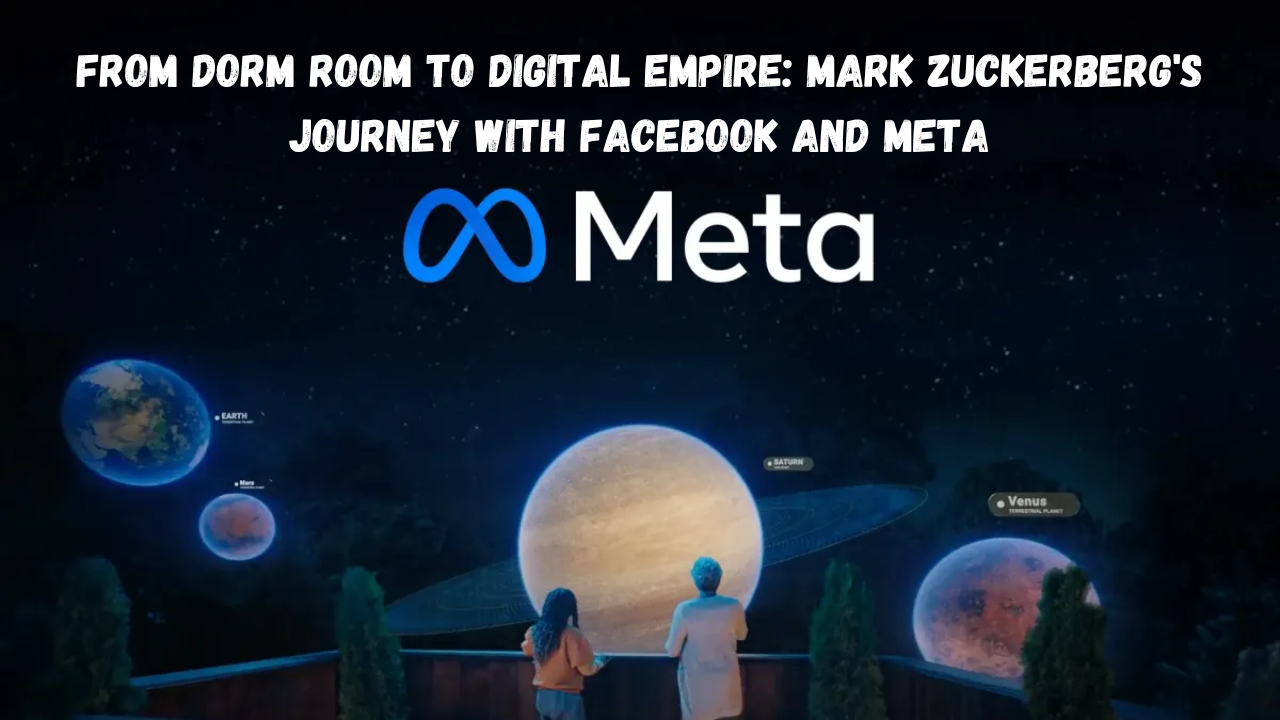From Dorm Room to Digital Empire: Mark Zuckerberg's Journey with Facebook and Meta
 Aakashi Jaiswal
Aakashi Jaiswal
Mark Zuckerberg's journey from a college dorm room to leading one of the world's most powerful companies is a fascinating tale of innovation, ambition, and resilience. This blog will explore the key milestones in Facebook's evolution, highlighting how a simple idea transformed into a global phenomenon that connects billions of people.
The Birth of an Idea

In 2004, Mark Zuckerberg was a 19-year-old Harvard University student with a passion for technology and social networking. While studying psychology and computer science, he created a website called Facemash, which allowed students to compare the attractiveness of their peers. Although Facemash was short-lived due to privacy concerns, it sparked an idea that would change the world: a social networking platform for college students.
On February 4, 2004, Zuckerberg, along with his roommates Eduardo Saverin, Dustin Moskovitz, Chris Hughes, and Andrew McCollum, launched The Facebook. Initially designed for Harvard students, the platform quickly gained popularity and expanded to other universities across the United States and Canada. By the end of 2004, Facebook had over one million users, prompting Zuckerberg to drop out of Harvard to focus on growing the platform full-time.
Early Challenges and Legal Battles
As Facebook grew rapidly, it faced several challenges. One significant hurdle was a lawsuit from the Winklevoss twins, who claimed that Zuckerberg had stolen their idea for a social networking site called Harvard Connection. Despite these legal battles and criticisms regarding user privacy and data security, Zuckerberg remained committed to improving Facebook's features and expanding its user base.
In 2005, Facebook received its first major investment from Peter Thiel, co-founder of PayPal. This funding allowed the company to enhance its infrastructure and user experience. The name was also shortened from "The Facebook" to simply "Facebook," making it more recognizable
Rapid Growth and Innovations

By 2006, Facebook opened its doors to anyone aged 13 and older with a valid email address. This expansion led to explosive growth; by the end of 2007, Facebook boasted over 50 million users. Key innovations during this period included the introduction of the News Feed in 2006 and the iconic Like button in 2009. These features not only enhanced user engagement but also reshaped how people interacted online.
Mark’s vision for Facebook extended beyond social networking. He aimed to create a platform where users could connect with friends and family while also discovering new content and communities. This vision attracted millions of users worldwide and solidified Facebook's position as a leader in social media.
Going Public and Major Acquisitions
In May 2012, Facebook went public with an initial public offering (IPO) that valued the company at $104 billion—making it one of the largest tech IPOs in history at that time. The IPO brought significant attention to Facebook but also scrutiny over its business model and profitability.
To diversify its offerings and maintain its dominance in social media, Facebook made several strategic acquisitions. In 2012, it acquired Instagram, a photo-sharing app that has since become integral to Facebook's ecosystem. Two years later, it purchased WhatsApp, further expanding its reach in messaging services.
A Commitment to Philanthropy

Zuckerberg's commitment to social responsibility is visible through his philanthropic efforts. In December 2015, he and his wife Priscilla Chan announced their intention to donate 99% of their Facebook shares (valued at billions) through the Chan Zuckerberg Initiative. This foundation focuses on education, health care, and other social issues.
Mark's approach contrasts sharply with many CEOs who take large salaries; he famously takes a salary of just $1 per year. His wealth primarily comes from his substantial ownership stake in Facebook.
Facing Controversies
Despite its success, Facebook has faced numerous controversies over privacy issues and misinformation on its platform. The Cambridge Analytica scandal in 2018 raised significant concerns about user data protection when it was revealed that millions of users' data had been harvested without consent for political advertising purposes.
Zuckerberg testified before Congress regarding these issues, emphasizing his commitment to improving user privacy and security measures on the platform. These challenges have prompted ongoing discussions about regulation in the tech industry.
The Evolution into Meta

In October 2021, Facebook rebranded itself as Meta to reflect its broader ambitions beyond social media into virtual reality (VR and augmented reality (AR). This shift aims to build what Zuckerberg calls the Metaverse, an immersive digital space where people can interact in real-time through avatars.
Meta's vision includes creating interconnected virtual experiences that blend physical and digital realities. While this ambitious goal has garnered excitement about future possibilities, it also raises questions about privacy and data security in these new environments.
Looking Ahead
As Meta continues to evolve, it faces both opportunities and challenges in navigating the complexities of digital interaction. The company's investments in artificial intelligence (AI) aim to enhance user experience across its platforms—Facebook, Instagram, WhatsApp—and drive innovation in content creation.
Despite facing criticism for its role in spreading misinformation and privacy concerns, Meta remains one of the largest companies globally by market capitalization. Its platforms connect over 3 billion users daily, making it an essential part of modern communication.
Conclusion
Mark Zuckerberg's journey from a college dorm room to leading one of the world's most influential companies is a testament to creativity, determination, and vision. Facebook's evolution into Meta signifies not just a change in name, but an ambitious leap into redefining how people connect digitally.
As we celebrate two decades since Facebook's inception, it's clear that its impact on society is profound—reshaping communication patterns and influencing cultural trends worldwide. The next chapter for Meta will undoubtedly be exciting as it continues to innovate while addressing pressing concerns around privacy and responsibility. In conclusion, Mark Zuckerberg’s story serves as an inspiration for aspiring entrepreneurs everywhere: with creativity and resilience, it's possible to change the world from even the humblest beginnings.
Subscribe to my newsletter
Read articles from Aakashi Jaiswal directly inside your inbox. Subscribe to the newsletter, and don't miss out.
Written by

Aakashi Jaiswal
Aakashi Jaiswal
Coder | Winter of Blockchain 2024❄️ | Web-Developer | App-Developer | UI/UX | DSA | GSSoc 2024| Freelancer | Building a Startup | Helping People learn Technology | Dancer | MERN stack developer